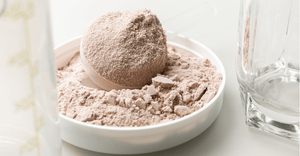How Much Protein A Day To Build Muscle: Insane Results
As you might already know, protein is a crucial macronutrient if you're looking to pack on muscle. That's because proteins are the building blocks for our muscles.
You've most likely stumbled upon this article because you're asking yourself - how much protein do I need a day to gain muscle?
That's an excellent question, and knowing the answer to this is of utmost importance if you want to start packing on size.
We've taken the time to research optimal protein consumption so that we can provide you, our readers, with a simple and clear answer.
If you want to know how much protein you will need to build lean muscle mass, make sure to keep reading.
Why do your muscles need protein?
Before diving further into this article, it's important to know exactly why our muscles need protein.
Protein is a nutrient consisting of building blocks, which are called amino acids. These amino acids work together to help your body repair and build new cells.
Our muscles need protein to function, repair and gain muscle mass. Because the nutrient is so deeply involved in the muscles, it's crucial to ensure your body gets in a sufficient amount daily.
Without protein, your body is unable to repair your muscle accordingly and unable to build new muscle mass. Research found that supplementing protein in combination with working out results in faster recovery and improved protein synthesis.
Protein is also necessary to prevent muscle loss in a caloric deficiency or the elderly. Researchers found that if you take more protein during caloric restriction, you are more likely to burn fat instead of muscle mass.
It's also good to know that protein isn't just helpful in building lean muscle tissue. This nutrient comes with many other benefits for your health.
For example, a high protein diet has been scientifically proven to help boost metabolism and reduce cravings. That means it's going to help you lose fat quicker.
Now you're aware of just how important protein is for the body and muscles, we're going to show you the amount you need to consume for optimal gains.
How much protein to build muscle
The moment you've all been waiting for - how much protein do you need per day to build muscle tissue?
A lot of scientific research has been done on this topic. When we look at the data available, it would be best if you consumed roughly 1.6 grams of protein per kilo of body weight, as this yielded the most optimal results.
Look at the graphic below to see how protein intake affects fat-free mass (FFM).

Researchers also looked at higher dosages of protein consumption. They had one group consume 2.4 grams of protein per kilo of body weight, but there was no difference in fat-free mass results.
As you can see, the bare minimum the body needs to increase fat-free mass is 0.8 grams of protein per kg of bodyweight. But, increasing that to 1.6 grams yields much better results.
That means if you want to gain muscle efficiently, you have to make sure you're consuming 1.6 x your body weight.
We've put together a helpful table below; check it out.
| Bodyweight | Protein intake per day |
|
60kg (132lbs) |
96 grams |
|
70kg (154lbs) |
112 grams |
|
80kg (176lbs) |
128 grams |
|
90kg (198lbs) |
144 grams |
|
100kg (220lbs) |
160 grams |
Many of you might also wonder if it makes sense to eat more than 1.6 grams of protein per kg of body weight. The opinions on this are mixed, but the truth is, eating more protein isn't going to harm you or your gains.
So, if you want to bump that number up to 2 grams of protein per kg of body weight, you can do so. The most important thing is that you hit the minimum of 1.6 grams, then you're good.
Once you start providing your body and muscles with the right amount of protein, you will begin to notice drastic improvements in both your physique and performance.
How much protein per meal and safety
There's lots of debate going on on the safety and effectiveness of the amount of protein you eat a day and per meal.
A study from 2016 found out that long-term protein consumption at 2 g per kg body weight is safe for healthy adults. However, they also concluded that eating more than 2 g per kg body weight per day should be avoided since you could experience digestive, renal, and vascular abnormalities(7).
Another study did a 1 year trial with a high protein diet between 2.51-3.32 grams per kg bodyweight. They concluded that there were no harmful effects of this diet, since they checked blood lipids and metabolic panel(8).
We can conclude that a high-protein diet is safe for healthy adults.
However, you would need to eat a lot of protein for each meal to crush your goal. Some researchers suggest that 20 grams of protein per meal, is perfect for maximal protein synthesis. 20 grams and above would lead to stimulated amino acid oxidation and ureagenesis(9).
A study on how much protein the body can handle each meal concluded that the average is 0,4 x kg body weight per meal. They concluded that you would need at least 1.6 grams per kg of body weight a day for optimal muscle gains(10).
As you can see, even the researchers have a different opinion on how much protein your body can handle each meal. A good standpoint would be eating between 20-40 grams of protein per meal.
The best protein sources for muscle gains
Now that we've shown you how much protein you need to eat, you'll want to know which protein sources are the best options.
There are a lot of different food sources out there that are rich in protein. If you're looking for the most optimal and popular protein sources, we recommend chicken, red meat, eggs, fish, and whey protein powder.
However, some studies did compare the amount of muscle protein synthesis between soy, casein, and whey protein. They concluded that whey protein has the most significant muscle protein synthesis response during exercise recovery(11).
If you're struggling to hit your daily protein intake, check out our Huge Whey. This protein powder packs nearly 25 grams of protein per scoop, which will be very useful to help you hit your daily macronutrient goals.
The Bottom Line
Protein is a key nutrient in the muscle-building process. Without it, your body won't be able to grow or repair new muscle tissue.
After analyzing scientific research, we've concluded that eating 1.6 grams of protein/kg body weight is the most optimal for muscle gains.
The bare minimum you'll need is 0.8 grams of protein/kg body weight, but bumping that up to 1.6 grams yields much better results. You can go over the 1.6 grams if you want to, but the opinions on whether that is useful are mixed.
Try and get your protein from food sources such as chicken, red meat, and eggs. If you're struggling with getting in enough protein, consider picking up our whey protein or vegan protein powder.
Not only is it very convenient and effective to add a protein powder to your diet, but they also taste amazing.
Don't forget that you'll also need to prioritize your training and recovery if you want to make muscle gains. Nutrition is important, but don't forget that you also need to prioritize your training and recovery.












Leave a comment